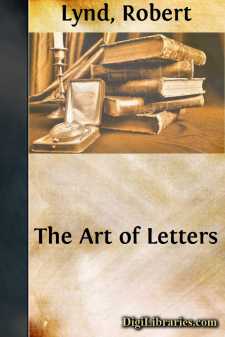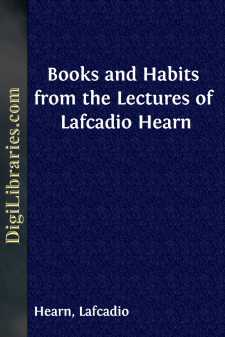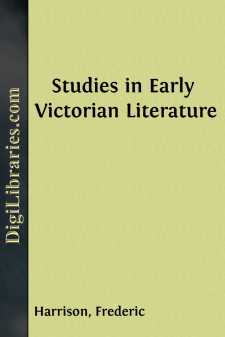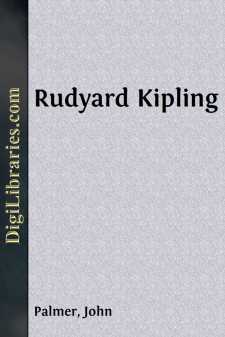Literary Criticism
- American 18
- Ancient and Classical 3
- Asian 1
- Australian & Oceanian 1
- Books & Reading 8
- Caribbean & Latin American 2
- Drama 2
- English, Irish, Scottish, Welsh
- European 7
- General 37
- Horror 1
- Humor 2
- Jewish 2
- Medieval 2
- Middle Eastern 3
- Poetry 7
- Renaissance 6
- Russian & Former Soviet Union 1
- Shakespeare 27
English, Irish, Scottish, Welsh Books
Sort by:
by:
Robert Lynd
I.—Mr. Pepys Mr. Pepys was a Puritan. Froude once painted a portrait of Bunyan as an old Cavalier. He almost persuaded one that it was true till the later discovery of Bunyan’s name on the muster-roll of one of Cromwell’s regiments showed that he had been a Puritan from the beginning. If one calls Mr. Pepys a Puritan, however, one does not do so for the love of paradox or at a guess. He tells...
more...
by:
Lafcadio Hearn
Introduction These chapters, for the most part, are reprinted from Lafcadio Hearn’s “Interpretations of Literature,” 1915, from his “Life and Literature,” 1916, and from his “Appreciations of Poetry,” 1917. Three chapters appear here for the first time. They are all taken from the student notes of Hearn’s lectures at the University of Tokyo, 1896-1902, sufficiently described in the...
more...
by:
Henry Coppee
Chapter I. The Historical Scope of the Subject. . . . . . . . . . Literature and Science. There are two words in the English language which are now used to express the two great divisions of mental production—Science and Literature; and yet, from their etymology, they have so much in common, that it has been necessary to attach to each a technical meaning, in order that we may employ them without...
more...
by:
Various
INTRODUCTION. In England, as elsewhere, criticism was a late birth of the literary spirit. English poets had sung and literary prose been written for centuries before it struck men to ask themselves, What is the secret of the power that these things have on our mind, and by what principles are they to be judged? And it could hardly have been otherwise. Criticism is a self-conscious art, and could not...
more...
CHAPTER I. The Subject Defined To attempt at the outset a rigid definition of the word romanticism would be to anticipate the substance of this volume. To furnish an answer to the question—What is, or was, romanticism? or, at least, What is, or was English romanticism?—is one of my main purposes herein, and the reader will be invited to examine a good many literary documents, and to do a certain...
more...
CHAPTER I. Walter Scott.[1] It was reserved for Walter Scott, "the Ariosto of the North," "the historiographer royal of feudalism," to accomplish the task which his eighteenth-century forerunners had essayed in vain. He possessed the true enchanter's wand, the historic imagination. With this in his hand, he raised the dead past to life, made it once more conceivable, made it even...
more...
INTRODUCTION A section of a long and splendid literature can be most conveniently treated in one of two ways. It can be divided as one cuts a currant cake or a Gruyère cheese, taking the currants (or the holes) as they come. Or it can be divided as one cuts wood—along the grain: if one thinks that there is a grain. But the two are never the same: the names never come in the same order in actual time...
more...
by:
Edmund Gosse
PREFACE: ON FLUCTUATIONS OF TASTE When Voltaire sat down to write a book on Epic Poetry, he dedicated his first chapter to "Differences of Taste in Nations." A critic of to-day might well find it necessary, on the threshold of a general inquiry, to expatiate on "Differences of Taste in Generations." Changes of standard in the arts are always taking place, but it is only with advancing...
more...
CHARACTERISTICS OF VICTORIAN LITERATURE That which in England is conveniently described as the Victorian Age of literature has a character of its own, at once brilliant, diverse, and complex. It is an age peculiarly difficult to label in a phrase; but its copious and versatile gifts will make it memorable in the history of modern civilisation. The Victorian Age, it is true, has no Shakespeare or...
more...
by:
John Palmer
I There is a tale of Mr Kipling which relates how Eustace Cleever, a celebrated novelist, came to the rooms of a young subaltern and his companions who were giving an account of themselves. Eustace Cleever was a literary man, and was greatly impressed when he learned that one of the company, who was under twenty-five and was called the Infant, had killed people somewhere in Burma. He was suddenly...
more...











